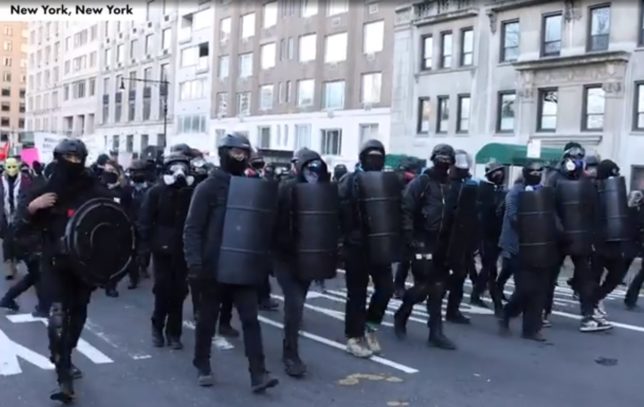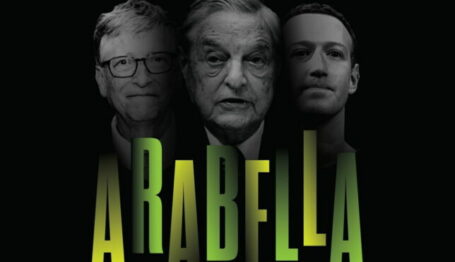Antifa
Unmasked Is a Valuable Contribution to Understanding Antifa
 Antifa march through Manhattan, January 10, 2021. Credit: New York Post.
Antifa march through Manhattan, January 10, 2021. Credit: New York Post.

In Unmasked: Inside Antifa’s Radical Plan to Destroy Democracy, journalist Andy Ngo observes that “Antifa is a household name in 2020 when they were virtually unheard of just five years prior.” Few outside of Antifa itself can claim to understand its activities better than Ngo. In Unmasked, he succeeds in making his knowledge accessible to an American public that might well know the name, but little else about the radical-left movement that captured headlines throughout 2020.
A Chronicle of Antifa and Unrest
Most of Unmasked revolves around two interrelated purposes, which are woven together in the narrative. First, Ngo describes what Antifa is—its history, structure, ideology, objectives, operations, and so forth. Second, he relates his personal on-the-ground work documenting Antifa and other closely related far-left movements over the past several years, specifically in the context of recent instances of American urban unrest.
Ngo gives a brief history of Antifa, in both Europe and the United States. He describes the riots that have ravaged parts of his hometown of Portland. He devotes an entire chapter to the internal training curriculum of that city’s local Antifa group—the oldest one in the United States. Another chapter chronicles Seattle’s anarchic Capitol Hill Autonomous Zone (CHAZ), which Ngo personally infiltrated for a week in June 2020. Other parts of the book are concerned with what Antifa does—including sections on the violence and intimidation Ngo claims to have been personally subjected to—as well as its associations with a number of groups, businesses, and individuals that don’t necessarily take on an “Antifa” public persona.
Throughout the book’s accounts of violence and criminality, a common theme continuously arises: The perpetrators are either not arrested or are released without being charged. Ngo cites a statistic from Portland showing that 90 percent of the nearly 1,000 riot- and protest-related cases referred to the district attorney’s office between May and October 2020 were dropped. In one case, criminal charges were dropped against an Antifa-associated individual, who was released from custody only to become the prime suspect in the killing of a right-wing demonstrator two months later.
Readers can hardly help but shake their heads at the book’s catalog of lawlessness, thinking that it could all have been stopped (or dramatically curtailed) by decisive and effective deployment of law enforcement. So why wasn’t it? By and large, Ngo seems to point the finger at the media and especially at elected officials, whose policies, rhetoric, and weak leadership made effective policing impossible.
In Portland, he argues that under Mayor Ted Wheeler “police have been made feckless. Morale is out the window.” The local district attorney instituted a policy of preemptively declining to prosecute many riot-related charges like interfering with an officer, disorderly conduct, criminal trespass, and escape from law enforcement.
The president of Seattle’s police union described that city’s riots as the lowest point in his 21-year career, noting that almost 100 officers had been injured in the riots without a single elected politician asking him how those officers were doing. Ngo paints a picture of local police being placed in an impossible position, and many readers will find these passages infuriating.
A Worthwhile Read
Though thoroughly endnoted and sourced, Unmasked is certainly not a neutral and detached work. In fact, it is notably personal throughout. Ngo relates much of it as a firsthand observer and journalist, and occasionally as a victim of Antifa violence and intimidation. The afterword describes his parents’ story as Vietnamese immigrants who endured the tortures and abuses of that country’s communist government before narrowly escaping to the United States. He notes the irony of his work documenting Antifa’s “virulent strain” of that brutal ideology, which now seems to be spreading in his parents’ adopted homeland.
The deeply charged nature of the book’s subject matter, and the recentness of many of the events it describes, means that Unmasked will be difficult for many to read dispassionately. Ngo is quite clear with his opinions about the danger that Antifa-style radicalism poses to American society writ large—opinions that readers may or may not precisely share. But he is careful not to be gratuitously inflammatory; the book’s tone is as measured as the subject matter reasonably permits, and its arguments are supported.
Indeed, Ngo relates a sympathy for those “exploited and used” by Antifa’s “twisted ideology.” He explains his research showing that those arrested at leftist riots are disproportionately (though not uniformly) among society’s most vulnerable, and Antifa’s promise of “community, protection, and purpose” can be “more than appealing” to them. Near the end of the book, he urges “compassion for those who have been drawn into this violent extremist ideology,” though not at the expense of effective law enforcement. Victory over Antifa, he writes, “requires people to be held accountable for their crimes.”
Timely and Informative
Relatively few in-depth treatments of Antifa are available to interested readers—a likely consequence of the movement’s recent emergence into public consciousness. This makes Unmasked a timely and informative work on the waves of unrest that Americans have witnessed in recent years. Anyone desiring to understand what underlies at least a portion of that unrest should have it on their shortlist.



